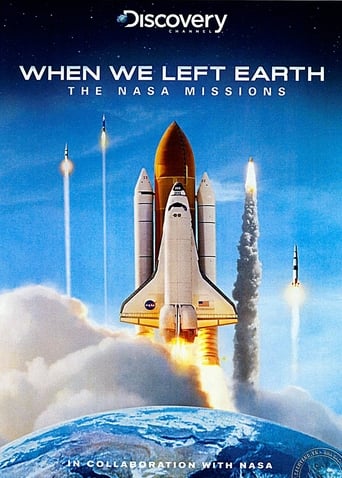denitaarnold19
I grew up with the space program, being born a month to the day after John Glenn's historic flight, and remember watching the moon missions on TV. I especially enjoyed the stories of the Mercury, Gemini & Apollo programs. There was 2 major flaws in the series, and that was the omission of Apollo 15, and the very brief mention of Apollo 1. People will think that Apollo 16 was the first to use the LRV, but it was Apollo 15. and to virtually bypass Apollo 1 is a crime against the memories of Gus, Ed, and Roger. Sad, really. but overall it's the best space documentary I've seen. And the appearance of Neil Armstrong makes it worth watching.
ksensenig
A wonderful series about the US space program. This is the documentary that needed to be made about the world's first entrance into the last frontier. Superbly done, this is one of my favorite documentary series ever produced. Everything, from story to music is close to perfect. Because they knew they were making history, the scientists, engineers, astronauts and others had enough foresight to record everything on film. I imagine hours and hours and hours of footage exists. Until now, this footage had not been crafted into the compelling story that was waiting to be told. Told chronologically, the story starts early in the space program, with rockets barely able to take off, and often exploding. As noted in the film, the task was to use these rockets with people on the top to get to the moon. It's a journey that will be remembered for thousands of years; humans' first travels in space.
antimatter33
This is one of a several "what we did then" historical retrospectives of the NASA human space flight program. In its favor, it includes interviews with Neil Armstrong himself, who was famously averse to such things, and even James McDivitt and Frank Borman, who are rarely seen. There is interesting footage of geology training and so on that will appeal to space buffs.However, the editing is done in the choppy and affected style of a rock music video, which quickly becomes extremely tiresome. The music is beyond awful, a mishmash of orchestral fake-dramatic boilerplate episodes, something like the trashy background sound of a video game. The narration is done in an irritatingly over-serious manner. Combined with the bad music, it is nearly impossible to get through this series without turning the volume off and just enjoying the views. Unfortunately, the best part of the series is hearing the astronauts in their own words, and you can't do that without slurping down the treacly music and Commander McBragg narration as well. Ultimately, this sinks the series, which is a shame.Some day, this material should be re-edited without much music, because none is needed, or at least, it should be kept to a bare and spare minimum. One wonders where they find the composers of this trash and how they manage to get themselves paid.Gary Sinese unfortunately also lacks the vocal authority for documentary narration. But that is a minor quibble.-drl
jjoseph202
Let me start out with the good stuff.This miniseries was good in that it captures, 30 to 50 years later, the thoughts and experiences of those who were there. The modern footage -- the interviews with the astronauts and flight controllers especially -- does what historical documentaries do best: captures the words and experience of those who were actually there. I especially liked the interviews with Gene Kranz, Jim Lovell, and -- of all people -- the nearly hermit-like Neil Armstrong.That said, the "HD" sequences are, by and large, limited by the resolution of the original (what a surprise), and calling them "HD" is a hyperbole at best, disingenuous at worst. So the Discovery channel's hype about digging stuff out of the vault and getting an HD-worthy presentation of this vintage footage is just that: hype. There are some priceless shots, like the slow-motion ground test footage of the explosively-jettisoned Mercury hatch. But, by and large, the "unearthed" footage is stuff we've seen before.What I detested most, though, was the U.S.-centric view of the writing. The script for the Skylab sequences would lead you to believe that the U.S. orbited the first space station. The Apollo 8 mission planning and execution was triggered by the placement of a Russian moon rocket on their launch pad, but this is overlooked.So, obviously, the "we" in "when we left earth", is Americans.A historical distortion, at best.



